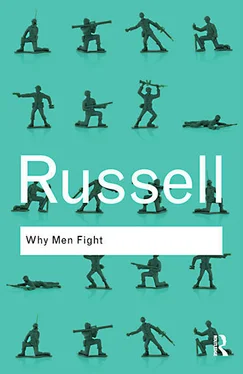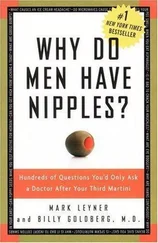Bertrand Russell - Why Men Fight
Здесь есть возможность читать онлайн «Bertrand Russell - Why Men Fight» весь текст электронной книги совершенно бесплатно (целиком полную версию без сокращений). В некоторых случаях можно слушать аудио, скачать через торрент в формате fb2 и присутствует краткое содержание. Город: London, Год выпуска: 2010, ISBN: 2010, Издательство: Routledge, Жанр: Философия, Публицистика, на английском языке. Описание произведения, (предисловие) а так же отзывы посетителей доступны на портале библиотеки ЛибКат.
- Название:Why Men Fight
- Автор:
- Издательство:Routledge
- Жанр:
- Год:2010
- Город:London
- ISBN:978-0-203-86469-2
- Рейтинг книги:3 / 5. Голосов: 1
-
Избранное:Добавить в избранное
- Отзывы:
-
Ваша оценка:
- 60
- 1
- 2
- 3
- 4
- 5
Why Men Fight: краткое содержание, описание и аннотация
Предлагаем к чтению аннотацию, описание, краткое содержание или предисловие (зависит от того, что написал сам автор книги «Why Men Fight»). Если вы не нашли необходимую информацию о книге — напишите в комментариях, мы постараемся отыскать её.
— discusses war, pacifism, reason, impulse and personal liberty, and greatly contributed to Russells fame as a formidable social critic and anti-war activist.
“The supreme principle, both in politics and in private life, should be to promote all that is creative, and so to diminish the impulses and desires that centre around possession.”
Bertrand Russell “Russell is one of the most profound thinkers of the modern age.”
The New York Times
Why Men Fight — читать онлайн бесплатно полную книгу (весь текст) целиком
Ниже представлен текст книги, разбитый по страницам. Система сохранения места последней прочитанной страницы, позволяет с удобством читать онлайн бесплатно книгу «Why Men Fight», без необходимости каждый раз заново искать на чём Вы остановились. Поставьте закладку, и сможете в любой момент перейти на страницу, на которой закончили чтение.
Интервал:
Закладка:
Both patriotism and love of man and woman, when they are merely instinctive, have the same defects: their exclusions, their enclosing walls, their indifference or hostility to the outside world. It is through this that thought is led to satire, that comedy has infected what men used to consider their holiest feelings. The satire and the comedy are justified, but not the death of instinct which they may produce if they remain in supreme command. They are justified, not as the last word of wisdom, but as the gateway of pain through which men pass to a new life, where instinct is purified and yet nourished by the deeper desires and insight of spirit.
The man who has the life of the spirit within him views the love of man and woman, both in himself and in others, quite differently from the man who is exclusively dominated by mind. He sees, in his moments of insight, that in all human beings there is something deserving of love, something mysterious, something appealing, a cry out of the night, a groping journey, and a possible victory. When his instinct loves, he welcomes its help in seeing and feeling the value of the human being whom he loves. Instinct becomes a reinforcement to spiritual insight. What instinct tells him spiritual insight confirms, however much the mind may be aware of littlenesses, limitations, and enclosing walls that prevent the spirit from shining forth. His spirit divines in all men what his instinct shows him in the object of his love.
The love of parents for children has need of the same transformation. The purely instinctive love, unchecked by thought, uninformed by spirit, is exclusive, ruthless, and unjust. No benefit to others is felt, by the purely instinctive parent, to be worth an injury to one’s own children. Honour and conventional morality place certain important practical limitations on the vicarious selfishness of parents, since a civilized community exacts a certain minimum before it will give respect. But within the limits allowed by public opinion, parental affection, when it is merely instinctive, will seek the advantage of children without regard to others. Mind can weaken the impulse to injustice, and diminish the force of instinctive love, but it cannot keep the whole force of instinctive love and turn it to more universal ends. Spirit can do this. It can leave the instinctive love of children undimmed, and extend the poignant devotion of a parent, in imagination, to the whole world. And parental love itself will prompt the parent who has the life of the spirit to give to his children the sense of justice, the readiness for service, the reverence, the will that controls self-seeking, which he feels to be a greater good than any personal success.
The life of the spirit has suffered in recent times by its association with traditional religion, by its apparent hostility to the life of the mind, and by the fact that it has seemed to centre in renunciation. The life of the spirit demands readiness for renunciation when the occasion arises, but is in its essence as positive and as capable of enriching individual existence as mind and instinct are. It brings with it the joy of vision, of the mystery and profundity of the world, of the contemplation of life, and above all the joy of universal love. It liberates those who have it from the prison-house of insistent personal passion and mundane cares. It gives freedom and breadth and beauty to men’s thoughts and feelings, and to all their relations with others. It brings the solution of doubts, the end of the feeling that all is vanity. It restores harmony between mind and instinct, and leads the separated unit back into his place in the life of mankind. For those who have once entered the world of thought, it is only through spirit that happiness and peace can return.
8
WHAT WE CAN DO
What can we do for the world while we live?
Many men and women would wish to serve mankind, but they are perplexed and their power seems infinitesimal. Despair seizes them; those who have the strongest passion suffer most from the sense of impotence, and are most liable to spiritual ruin through lack of hope.
So long as we think only of the immediate future, it seems that what we can do is not much. It is probably impossible for us to bring the war to an end. We cannot destroy the excessive power of the State or of private property. We cannot, here and now, bring new life into education. In such matters, though we may see the evil, we cannot quickly cure it by any of the ordinary methods of politics. We must recognize that the world is ruled in a wrong spirit, and that a change of spirit will not come from one day to the next. Our expectations must not be for to-morrow, but for the time when what is thought now by a few shall have become the common thought of many. If we have courage and patience, we can think the thoughts and feel the hopes by which, sooner or later, men will be inspired, and weariness and discouragement will be turned into energy and ardour. For this reason, the first thing we have to do is to be clear in our own minds as to the kind of life we think good and the kind of change that we desire in the world.
The ultimate power of those whose thought is vital is far greater than it seems to men who suffer from the irrationality of contemporary politics. Religious toleration was once the solitary speculation of a few bold philosophers. Democracy, as a theory, arose among a handful of men in Cromwell’s army; by them, after the Restoration, it was carried to America, where it came to fruition in the War of Independence. From America, Lafayette and the other Frenchmen who fought by the side of Washington brought the theory of democracy to France, where it united itself with the teaching of Rousseau and inspired the Revolution. Socialism, whatever we may think of its merits, is a great and growing power, which is transforming economic and political life; and socialism owes its origin to a very small number of isolated theorists. The movement against the subjection of women, which has become irresistible and is not far from complete triumph, began in the same way with a few impracticable idealists—Mary Wollstonecraft, Shelley, John Stuart Mill. The power of thought, in the long run, is greater than any other human power. Those who have the ability to think, and the imagination to think in accordance with men’s needs, are likely to achieve the good they aim at sooner or later, though probably not while they are still alive.
But those who wish to gain the world by thought must be content to lose it as a support in the present. Most men go through life without much questioning, accepting the beliefs and practices which they find current, feeling that the world will be their ally if they do not put themselves in opposition to it. New thought about the world is incompatible with this comfortable acquiescence; it requires a certain intellectual detachment, a certain solitary energy, a power of inwardly dominating the world and the outlook that the world engenders. Without some willingness to be lonely new thought cannot be achieved. And it will not be achieved to any purpose if the loneliness is accompanied by aloofness, so that the wish for union with others dies, or if intellectual detachment leads to contempt. It is because the state of mind required is subtle and difficult, because it is hard to be intellectually detached yet not aloof, that fruitful thought on human affairs is not common, and that most theorists are either conventional or sterile. The right kind of thought is rare and difficult, but it is not impotent. It is not the fear of impotence that need turn us aside from thought if we have the wish to bring new hope into the world.
In seeking a political theory which is to be useful at any given moment, what is wanted is not the invention of a Utopia, but the discovery of the best direction of movement. The direction which is good at one time may be superficially very different from that which is good at another time. Useful thought is that which indicates the right direction for the present time. But in judging what is the right direction there are two general principles which are always applicable.
Читать дальшеИнтервал:
Закладка:
Похожие книги на «Why Men Fight»
Представляем Вашему вниманию похожие книги на «Why Men Fight» списком для выбора. Мы отобрали схожую по названию и смыслу литературу в надежде предоставить читателям больше вариантов отыскать новые, интересные, ещё непрочитанные произведения.
Обсуждение, отзывы о книге «Why Men Fight» и просто собственные мнения читателей. Оставьте ваши комментарии, напишите, что Вы думаете о произведении, его смысле или главных героях. Укажите что конкретно понравилось, а что нет, и почему Вы так считаете.












